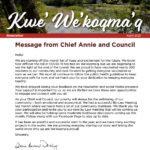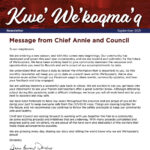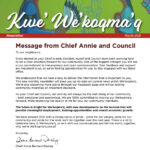ORIGINAL STORY FROM THE CAPE BRETON POST – Ardelle Reynolds · Multimedia journalist

WE’KOQMA’Q – A new initiative in We’koqma’q First Nation makes it the second of five First Nations communities in Unama’ki to launch a food bank since the beginning of the pandemic.
The food bank in We’koqma’q open its doors on June 1 and served 28 families on that first day.
Tillie Googoo, the director for social development at the We’koqma’q band office, said it is something she has wanted to have in the community for years but when COVID-19 hit the need became more urgent.
“For anyone on social assistance, there’s a struggle to make it to the next cheque date, so we wanted to do something to help these community members that need extra help or extra food,” she said.
“We’re not discriminating of what income you have, we go by if you need it. We have an open-door policy to anyone who needs help.”

Googoo said the food bank provides food bags meant to last a few days based on how many people are living in the home. People call ahead to order a bag, and the food bank is open every second Wednesday for pick-up or, in some cases, volunteers deliver the packages.
Each bag contains milk, bread, meat, cereal, toilet paper, laundry detergent and other foods and toiletries depending on what the food banks has in stock.
Googoo said the food bank made a financial contribution to the community garden, which will provide it with fresh vegetables later this month.
“We’re really working together as a community, a lot of community members donate food, so it’s really heartwarming for me to be able to help people,” she said.
The community was able to purchase two fridges and the first stockpile of food through a health funding grant and have been receiving donations from people and businesses in the community.
We’koqma’q is a rapidly growing community with just over 1,000 people, with more than half of them under 30. Googoo has been working in the band office for 20 years and said she has seen the struggles people have on a day-to-day basis.
“Trying to eat healthy, or just trying to buy food, I know it’s hard, especially on social assistance because our rates haven’t changed since 1994, so I know they’re not getting enough money, and single mothers are struggling too,” she said.
“It’s really important to me to just improve their overall quality of health and I feel great at the end of each day.”

In the late fall of 2020, Potlotek First Nation opened its first permanent food bank after running a mobile food bank for three years. The food bank serves about 50 households bi-weekly in the community of just over 500. A community garden and greenhouse provide fresh vegetables that will be available year-round.
In We’koqma’q, Googoo said the food bank averages 20 to 30 clients every two weeks.
The new food bank has limited space right now in the We’koqma’q band office, and Googoo has even had to put a deep freezer in her office, but she said the set-up is working well for now. She sets a schedule for people to pick up their packages to avoid overcrowding and to ensure they are following public health protocols.
Googoo said she hopes other communities will follow the lead of We’koqma’q and Potlotek and open their own food banks.
“We’re really proud of it, and of our community coming together. It’s amazing.”
Ardelle Reynolds is an Indigenous Affairs reporter at the Cape Breton Post.





